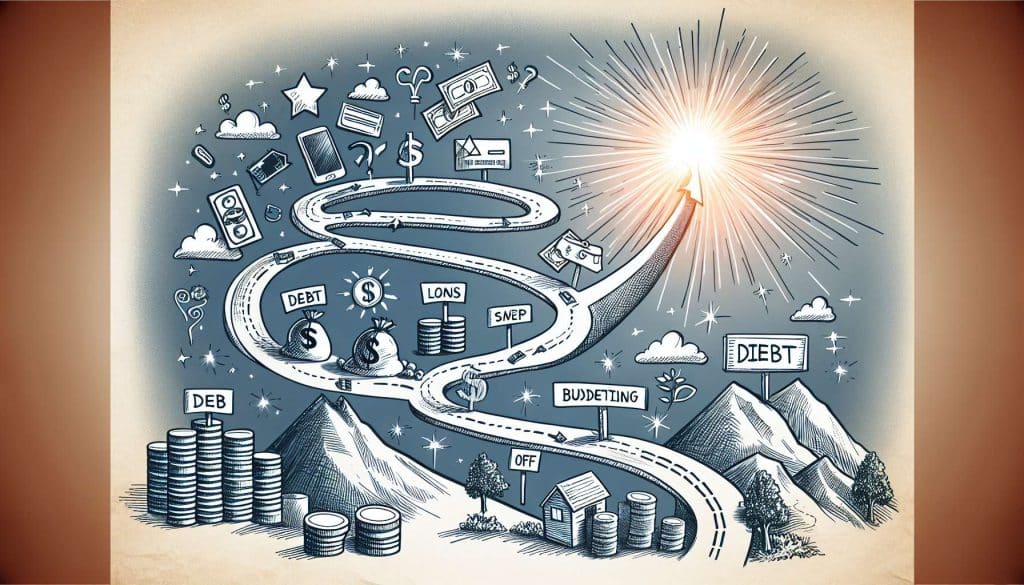Debt Mastery: Your Guide to Achieving Financial Independence


**Mastering Debt Management: Regain Control of Your Financial Destiny**
Anúncios
Debt can cast a daunting shadow over your financial journey, affecting both your immediate lifestyle and future aspirations. The stress accompanying burdensome debt often creates a cycle of anxiety and worry. Nevertheless, with the right strategies and mindset, you can navigate your way out of debt and regain control over your finances. This guide is designed to empower you, providing you with the tools and insights to master debt management as you pursue financial independence.
In a world where access to credit is seemingly limitless, debt management has become a critical skill. From credit card balances to student loans and beyond, understanding how to navigate the debt landscape can make a profound impact on your financial health and stress levels. Begin your journey to sound financial practices by exploring the responsible management and reduction of debt, which can reap long-term benefits beyond immediate relief.
Debt management doesn’t just address the numbers; it aims to relieve the strain that debt imposes on everyday life and future goals. Through actionable strategies and a commitment to change, debt becomes a manageable aspect of your financial picture rather than an overwhelming burden. By delving into these principles, you’ll embark on a path that empowers you toward a more secure fiscal future, free from the shackles of overwhelming debt.
Understanding the Debt Landscape
Before embarking on a debt management journey, you must first gain clarity on your current financial situation. This involves taking a thorough inventory of all your outstanding debts. Creating a comprehensive list, inclusive of details such as interest rates, balances, and due dates, will provide a clear picture of where you stand financially. An organized overview allows for targeted strategies that prioritize which debts to tackle first.
Equally important is understanding your debt-to-income ratio (DTI), an indicator of your borrowing health. By dividing your monthly debt obligations by your gross monthly income, you can derive a DTI percentage that offers insight into your capacity to service existing debt while planning for repayment. Striving for a DTI below 36% is generally considered healthy.
Your monthly budget also plays a crucial role in debt management. Analyze your spending to identify potential savings that can be reallocated towards debt repayment. This information forms the backbone of more informed spending and allocation decisions, enabling you to set realistic financial goals that support a structured debt reduction plan.
Once these preparatory steps are complete, multiple strategies exist to manage debt effectively, each suited to different circumstances. The debt snowball and avalanche methods are the most recognized approaches, providing alternatives that cater to either psychological momentum or long-term savings on interest. Choosing the best method depends on personal preferences and financial conditions.
Consolidating debts can simplify repayments and potentially reduce interest burdens by combining multiple payments into one. This streamlining, however, requires careful evaluation of associated terms and potential fees to ensure that it is, indeed, a beneficial move. Regular reviews and adjustments remain crucial to keep the management plan effective and responsive to your unique financial landscape.
Key Characteristics of Debt Management
- Importance of understanding your full debt situation.
- Strategies such as debt snowball and avalanche methods.
- Consolidation of debts for simplified repayment.
- Regular assessment and flexibility in financial planning.
Benefits of Effective Debt Management
Effective debt management extends beyond immediate relief from financial pressure. It offers long-term benefits, guiding you towards a future of financial stability and independence. Among these benefits is the improved ability to manage monthly obligations without stress, providing a more comfortable lifestyle even as you work towards becoming debt-free.
Proper management of debt can also enhance your credit health, reducing costs in the long run. A solid debt management plan reduces debt faster, which in turn can positively affect your credit score, opening doors to more favorable borrowing options in the future. This cycle of positive financial behavior becomes a foundation for financial resilience.
With debts under control, additional opportunities arise for savings and investment, which further strengthens financial security. As the financial burden decreases, more income can be redirected back into building wealth, creating pathways for achieving larger financial goals such as home ownership or retirement planning.
Debt management fosters greater awareness and discipline regarding financial habits. Mindful spending support sustained financial health, preventing the reemergence of problematic debt patterns and cultivating a proactive approach to personal finance.
- Reduces stress and improves daily living conditions.
- Improves credit score for better borrowing options.
- Increases potential for savings and investments.
- Encourages sustainable financial habits.
The journey of mastering debt management is an ongoing process requiring commitment and strategic planning. While progress may be gradual, each step towards improvement reduces financial stress and enhances your quality of life. With determination and the strategies delineated here, you are poised to transform your debt situation into an opportunity for financial growth and stability. Stay committed to your path; each responsible decision today builds the financial freedom you seek tomorrow.





